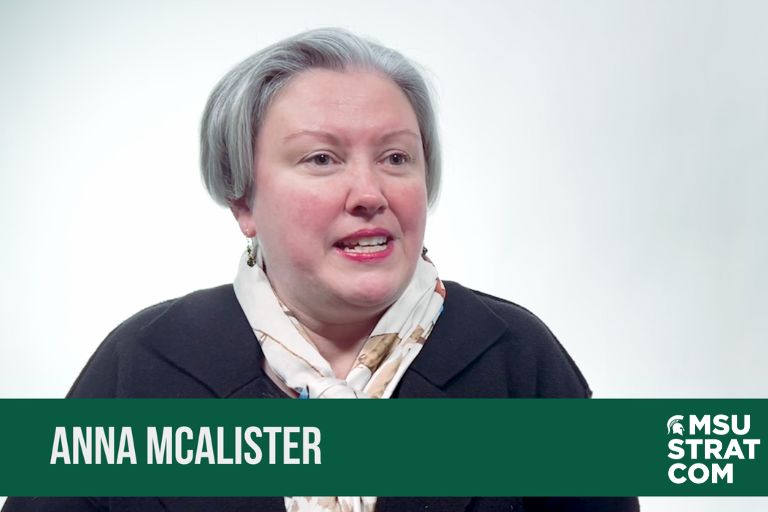MSU Strategic Communication professor, Anna McAlister has been teaching a persuasive writing course in our program since its start in 2017. The reason she has stayed in the program is the joy she gets from both teaching high quality students and the comradery of teaching with colleagues that are lifelong friends.
A happy accident
Dr. McAlister went to college studying psychology, thinking she wanted to be a therapist. She eventually switched gears towards the end of her doctoral studies once she got a taste for marketing through the relation that it played with her research in children’s behavioral studies.
“I often refer to my career as a series of happy accidents,” she said. “It was not a planned path, but I’m happy I ended up here.”
After completing a post-doctoral degree in marketing, she was hired at Michigan State Universities’ College of Communication Arts and Sciences in the Advertising and Public Relations department.
Persuasion Techniques for Working Professionals
Dr. McAlister teaches CAS 828: Persuasion Techniques for Working Professionals.
“It’s an important course for really anyone who works in communications or marketing related fields,” said McAlister. “Even if you don’t see yourself as being the person who creates a persuasive message, we are all receivers of those messages, all the time.”
McAlister explains people are constantly being bombarded with influential communications all the time through not only advertisements, but also politics and others. Therefore, it’s important that students understand how those messages are crafted and how they impact people.
“I think it’s super important to consider the ethics of persuasive messaging, so that’s a key component in the course as well.”
Connecting online
The best part about the program being completely online is that it allows students to complete the course work at any time throughout the day and week.
Many of the students have families, spouses and pets, and a whole life outside the classroom. Dr. McAlister prioritizes not assigning busy work to make the most of the teaching and learning experience.
A large part of the quality of the experience in StratCom depends largely on the student. There are many program and faculty connections that are made available. StratCom faculty work hard to be supportive and accessible. “I make myself available to my graduate students. I offer them my calendar to schedule time to meet with me right on there.”
“Whether it’s just a quick phone call, or if they’d like to meet via Zoom and have a more face-to-face-like conversation, I’m available,” said McAlister. “I find that most of the time when students schedule time to meet its quite rare that they’re wanting to connect on an assignment in the class. Often, they’re connecting with me because they want to talk about their career aspirations.”
Dr. McAlister clarifies how that’s more than fine with her. She’s happy to talk with her students about whatever she can help with.
“I recognize students have complicated lives, and sometimes life gets in the way of study, so in my class I offer a five-day grace period on all deadlines.”
A tight knit community from the start
A unique aspect of the StratCom program that Dr. McAlister loves is the faculty are very close with one another and work as a cohesive group.
Before the StratCom program came to be, a lot of the professors that teach in it were already friends. She explains how this means they’re always talking about the program, and they know the full curriculum.
And because of that students feel a cohesive flow from one course to another.
“The students become part of the fabric of this program. We have really good relationships with our alumni, and I think it’s partly due to having such a tight knit community starting with the faculty.”
